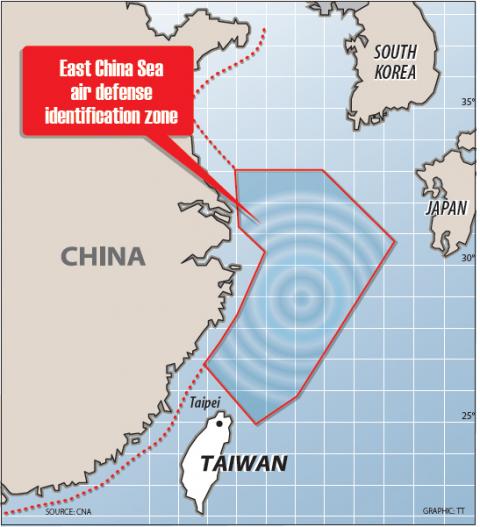Expressing regret that Beijing issued a map earlier in the day of an East China Sea air defense identification zone that includes the disputed Diaoyutai Islands (釣魚台), the Taiwanese government yesterday called on all parties involved to remain calm in dealing with the issue to avoid an escalation of regional tensions.
The islands, known as the Senkaku Islands in Japan, are also claimed by Taiwan and Japan.
China’s ministry of Defense issued a statement on its Web site yesterday regarding the establishment of the zone.

The statement was accompanied by a map and a set of rules regarding the zone, which stated that all aircraft must notify Chinese authorities and are subject to emergency military measures if they do not identify themselves or do not comply with orders from Beijing.
It did not elaborate on the punitive measures, but said the rules went into effect yesterday.
In response, Ministry of National Defense spokesman Major General David Lo (羅紹和) expressed regret over China’s move and said the military would take measures to protect national security and sovereignty in accordance with relevant regulations and rules.
Later yesterday, the National Security Council issued a statement which referred to the East China Sea peace initiative promoted by President Ma Ying-jeou (馬英九) in August last year and called on all parties to show restraint, shelve disputes and work together to develop the resources in the waters around the Diaoyutai Islands through joint efforts.
Commenting on the matter, Democratic Progressive Party Legislator Hsiao Bi-khim (蕭美琴), who sits on the Foreign Affairs and National Defense Committee, called on China not to incite regional tension.
Chinese Nationalist Party (KMT) Legislator Lin Yu-fang (林郁方), who also sits on the legislature’s Foreign Affairs and National Defense Committee, suggested that China’s move was aimed at Japan, as China did not include Taiwan’s Pengjia Islet (彭佳嶼) in its East China Sea air defense identification zone.
Li Fung, a Hong Kong-based Chinese military expert, said that China’s move can be regarded as an effort to bolster Beijing’s sovereignty claims over the islands.
It also showed the Chinese government is preparing for military conflict with Japan over the disputed islands, Li said.
Tensions between China and Japan have escalated after Japan purchased three of the five Senkaku Islands from their private owners in September last year and nationalized them.
This move was seen as undermining a tacit agreement between China and Japan, Li said.
Japan has also taken a similar measure by creating a military identification zone over the disputed islands, Li added.
Since then, China has sent regular coast guard patrols to the islands, which are 200km northeast of Taiwan and 400km west of Japan’s Okinawa.

Tropical Storm Gaemi strengthened into a typhoon at 2pm yesterday, and could make landfall in Yilan County tomorrow, the Central Weather Administration (CWA) said yesterday. The agency was scheduled to issue a sea warning at 11:30pm yesterday, and could issue a land warning later today. Gaemi was moving north-northwest at 4kph, carrying maximum sustained winds near its center of up to 118.8kph and gusts of 154.8kph. The circumference is forecast to reach eastern Taiwan tomorrow morning, with the center making landfall in Yilan County later that night before departing from the north coast, CWA weather forecaster Kuan Shin-ping (官欣平) said yesterday. Uncertainty remains and

SEA WARNING LIKELY: The storm, named Gaemi, could become a moderate typhoon on Wednesday or Thursday, with the Taipei City Government preparing for flooding A tropical depression east of the Philippines developed into a tropical storm named Gaemi at 2pm yesterday, and was moving toward eastern Taiwan, the Central Weather Administration (CWA) said. Gaemi could begin to affect Taiwan proper on Tuesday, lasting until Friday, and could develop into a moderate typhoon on Wednesday or Thursday, it said. A sea warning for Gaemi could be issued as early as Tuesday morning, it added. Gaemi, the third tropical storm in the Pacific Ocean this typhoon season, is projected to begin moving northwest today, and be closest to Taiwan on Wednesday or Thursday, the agency said. Today, there would likely

DISRUPTIONS: The high-speed rail is to operate as normal, while several airlines either canceled flights or announced early departures or late arrivals Schools and offices in 15 cities and counties are to be closed today due to Typhoon Gaemi, local governments announced last night. The 15 are: Taipei, New Taipei City, Taoyuan, Tainan, Keelung, Hsinchu and Kaohsiung, as well as Yilan, Hualien, Hsinchu, Miaoli, Chiayi, Pingtung, Penghu and Lienchiang counties. People should brace for torrential rainfall brought by the storm, with its center forecast to make landfall on the east coast between tonight and tomorrow morning, the Central Weather Administration (CWA) said. The agency issued a sea warning for the typhoon at 11:30pm on Monday, followed by a land warning at 11:30am yesterday. As of

CASUALTY: A 70-year-old woman was killed by a falling tree in Kaohsiung as the premier warned all government agencies to remain on high alert for the next 24 hours Schools and offices nationwide are to be closed for a second day today as Typhoon Gaemi crosses over the nation, bringing torrential rain and whipping winds. Gaemi was forecast to make landfall late last night. From Tuesday night, its outer band brought substantial rainfall and strong winds to the nation. As of 6:15pm last night, the typhoon’s center was 20km southeast of Hualien County, Central Weather Administration (CWA) data showed. It was moving at 19kph and had a radius of 250km. As of 3pm yesterday, one woman had died, while 58 people were injured, the Central Emergency Operation Center said. The 70-year-old